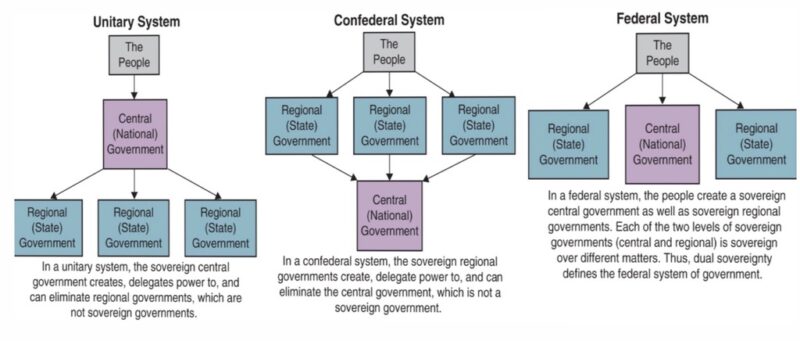- Home
- Prelims
- Mains
- Current Affairs
- Study Materials
- Test Series
Federal Spirit of the Indian Constitution
On January 26, 1950 when the Indian Constitution came into force, it was a big step for the nation that had longed to achieve the ideals of justice, equality, liberty and fraternity.
In a country of subcontinental proportions, it is necessary that the ideals mentioned in the Preamble to the Constitution should extend to all levels of governance. The overall emphasis on equality in the Constitution is visible in all arrangements made around the federal spirit and ideas.
Conscious of the differential needs of the populations of different states, the drafters of the Constitution made provisions for an equitable share of powers and responsibilities among different levels of governments. Unfortunately, India in recent years has been witnessing the worst assault on the federal system and on institutions.
 The Federal Structure of India
The Federal Structure of India
 The Federal Structure of India
The Federal Structure of India
- Nature of Indian Federalism: A Federal theorist K. C. Wheare has argued that the nature of Indian Constitution is quasi-federal in nature.
- The SC in Sat Pal v State of Punjab and Ors (1969), held that the Constitution of India is more Quasi-federal than federal or unitary.
- Constitutional Provisions for Ensuring Federalism: The respective legislative powers of states and Centre are traceable to Articles 245 to 254 of the Indian Constitution.
- The lists in the 7th Schedule of the Constitution — Union, State and Concurrent also exemplify equitable share of powers, wherein each level of government has its own sphere, enabling context-sensitive decision-making.
- Article 263provided for the establishment of an Inter-State Council for smooth transition of business between the Union and states and resolution of disputes.
- Article 280provided for the constitution of the Finance Commission to define the financial relationship and terms between the Union and states.
- Also, the institutions for local self government were added through the 73rd and 74th amendments, to strengthen the grass roots democracy.
- Institutions for Federalism: The Planning Commission always had space for discussion on issues concerning the federal nature of the polity and was sensitive to the different developmental requirements of states.
- The inter-state tribunals, the National Development Council and other informal bodies have served as vehicles of consultations between the Union, states and UTs.
- These bodies have been instrumental in tackling difficult issues democratically through deliberations while upholding the cooperative spirit between the Union and states.
- Ineffective Functioning of Several Bodies: The Planning Commission has been scrapped, the Inter-State Council has met only once in the last seven years while the National Development Council has not met at all.
- These events have led to obstructions in upholding the cooperative spirit between the Union and states.
- Issues in Tax Regime: The misconceived Goods & Services Tax (GST) has already taken away much of the autonomy available to states and has made the country’s indirect tax regime unitary in nature.
- During the pandemic, the Union government repeatedly violated the compensation guarantees to the States under the GST regime. Delay in paying the States their due worsened the impact of the economic slowdown.
- Encroachments Upon States’ Autonomy in State Subjects: Many important and politically sensitive decisions have been taken in the past few years, without reference to, and consultation with, the concerned states such as:
- Article 370was removed without consulting the state legislature.
- Parliament legislated on “agriculture” in the state list, to enact the three contentious farm laws, overstepping its jurisdiction and imposing a law on the states.
- The New Education Policy 2020has also been flagged as encroaching on the federal nature of the polity.
- Additionally, the BSF’s jurisdiction was extended in Assam, West Bengal and Punjab without any consultation with the concerned states.
- Impact of Covid-19:The states were curtailed in aspects relating to Covid-19 management such as procurement of testing kits, vaccination, the use of the Disaster Management Act, 2005, and the unplanned national lockdown.
- Moreover, the ill-prepared government during the Second Wave countered criticism by claiming health as a ‘State subject’.
- Recognition of Federalism: It should be underlined that Article 1of the Constitution declares that “India that is Bharat is a union of states”, and that devolution of powers is necessary in such a setting.
- A conscious recognition of the federal character of India’s polity is essential to protect its national character.
- A struggle at all levels shall be waged against those who try to usurp the federal rights of the other, be it the local level government against the states or the state government against the centre.
- Strengthening Inter-State Relations: State governments shall consider deploying human resources to support them in preparing responses to the consultations initiated by the Union, especially with a focus on the federalism angle.
- Instead of reaching out to each other only during crisis situations, Chief Ministers may create forums for regular engagement on this issue.
- This would be crucial in the advocacy of major demands like the extension of GST compensation to 2027 and inclusion of cess in the divisible pool of taxes.
- Bringing Reforms while Balancing Federalism: A diverse country India requires a proper balance between the pillars of federalism(autonomy of states, centralisation, regionalisation etc). Extreme political centralisation or chaotic political decentralisation shall be avoided as both lead to the weakening of Indian federalism.
- Proper utilisation of the institutional mechanism of the Inter-state Council must be ensured to develop political goodwill between the Centre and the States on contentious policy issues.









 Latest News
Latest News
 General Studies
General Studies